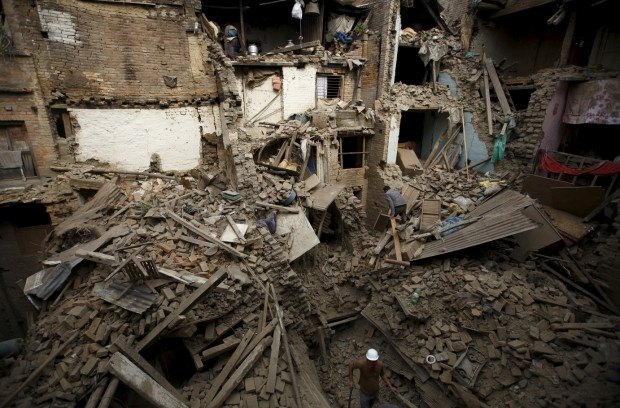Nepal earthquake: Thousands in fear of disease queue to get buses to flee devastated Kathmandu

The mass exodus from Nepal's devastated capital has begun, following growing fears a secondary crisis involving diseases such as cholera and potentially fatal diarrhoea in children could strike, as water, sanitation and hygiene issues in the city remain unaddressed.
Just days after a 7.8 magnitude earthquake that killed 5,020, families are desperate to the leave the city, in which overwhelmed authorities are trying to cope with a shortage of drinking water, food and electricity.
With so many sleeping outdoors, fears the lack of proper hygiene could lead to epidemics such as dysentery or other diseases and an aggravating sanitation crisis and looming monsoons could worsen the situation.
According to the World Health Organization, only 27% of the population has access to adequate sanitation.
The UN agency said it believes that diarrheal diseases, dysentery, cholera and typhoid are the primary causes of death in the country.
Family of 18 told me they're braving 10hr wait for a bus to leave #kathmandu fearing infection disease @DatelineSBS pic.twitter.com/qC85XJ0PUa
— Meggie Palmer (@MeggiePalmer) April 29, 2015Only 5,000 people allowed on buses out of Kathmandu
Thousands of people before daybreak on Wednesday 29 April were outside the city's main bus station after the government promised to provide 500 buses to transport people free of cost out of Kathmandu Valley to their home districts in far-flung rural areas.
Organisations associated with private schools agreed with the Nepalese government on 28 April to provide buses to ferry the passengers.
More people than expected turned up along the Baneshwor-Tinkune road and only 67 buses turned up, after the vice-chairperson of one the private school associations, PABSON, told local media the prime minister's office was wrong in claiming it would provide 500 buses.
"But private school schools hardly have 200 buses. Since all the drivers could not work, we could only manage just over 140 buses. Obviously, there are thousands more people than we expected because of the wrong information the government provided," Dipika Rimal Thapa told Setopati.
She added a total of 135 buses had left the capital on 29 April with about 5,000 passengers. "We'll send 8 to 10 more buses with elderly and new mothers," she said.
FREE BUS SERVICE FROM #POKHARA TO #KATHMANDU #NepalEarthquake https://t.co/Sk3eQXZZx9 Please Share #Relief #Nepal pic.twitter.com/m3nisPdSCg
— Darjeeling Chronicle (@TheDarjChron) April 29, 2015HISAN chairman Umesh Shrestha told Setopati the organisation has provided bus passes to people to ease services on 30 April and 1 May but added it could not provide as many buses as wanted because of a lack of drivers. Shrestha requested other sectors to help support by providing their vehicles.
Free buses for all spark violence
As buses failed to materialise and entire families were denied free bus tickets, frustration mounted among those queueing.
Well intentioned,badly planned: free bus ride 4 every1 creating chaos.Ppl tryn to reach family in distress stranded pic.twitter.com/5HvaGci0LD
— Anurag Acharya (@Anurag_Acharya) April 29, 2015Fights also broke out between the crowds and riot police, who were sent in to try to contain the situation near the parliament building in the capital.
Riot police stood behind rolls of barbed wire as rioters armed with sticks surged into the street, attacking buses and other vehicles.
Some protesters forced a truck carrying drinking water off the road and climbed on top of it, throwing the bottles into the crowd, the AFP reported.
© Copyright IBTimes 2025. All rights reserved.






















